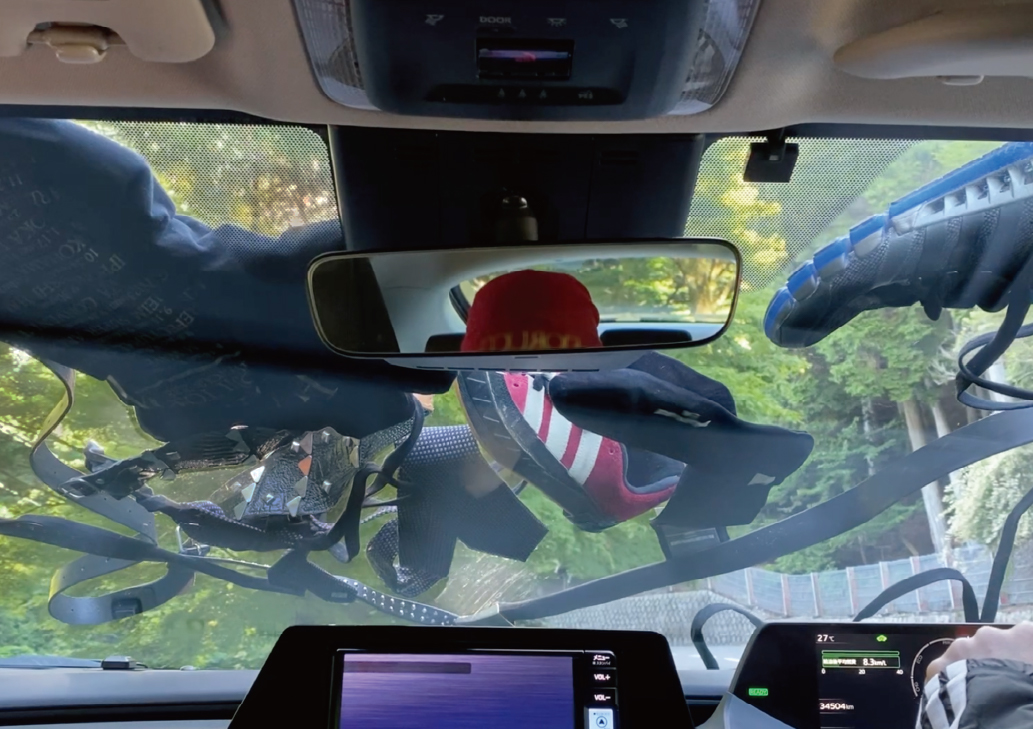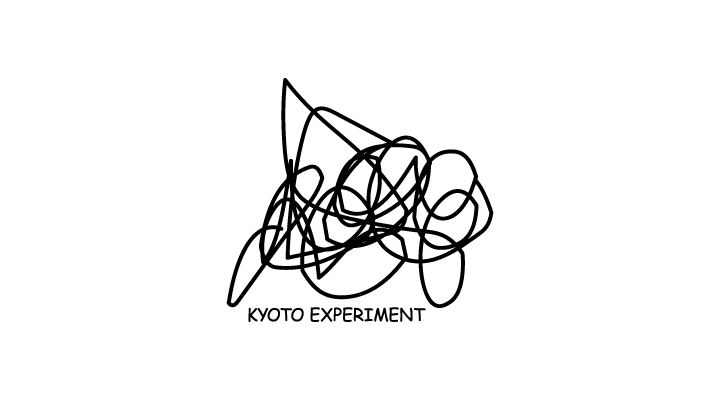Festival Overview
Kyoto Experiment:
Kyoto International Performing Arts Festival 2025
“nameless leaf clings to the matsutake mushroom”
Dates☞ October 4th (Sat) – October 26th (Sun) 2025 [23 days]
Venues:☞ ROHM Theatre Kyoto, KYOTO ART CENTER, Kyoto Art Theater Shunjuza, THEATRE E9 KYOTO, Kyoto City University of Arts Art Gallery, Library of Kyoto City University of Arts (ITO Memorial Library), Kyoto City Sakyo East Area Iki-Iki Citizen Activity Centre, CLUB METRO and other locations
Organized by
Kyoto International Performing Arts Festival Executive Committee [City of Kyoto, ROHM Theatre Kyoto (Kyoto City Music Art Cultural Promoting Foundation), KYOTO ART CENTER (Kyoto Arts and Culture Foundation), Kyoto Performing Arts Center at Kyoto University of the Arts, THEATRE E9 KYOTO (Arts Seed Kyoto)]
General Incorporated Association Kyoto Experiment
Kyoto Experiment?
Kyoto Experiment is a performing arts festival held in Kyoto since 2010. Dedicated to producing and presenting experimental performing arts—both from Japan and overseas— the festival aims to explore and create new dialogues and values in society. Featuring experimental works that move freely between genres such as theater, dance, music and fine art, the festival hopes to open up new possibilities through the creations, experiences, and ideas that emerge from such a diverse combination.
The festival consists of three programs: “Kansai Studies,” a program that researches the Kansai region, where the festival is rooted, and aims to cultivate a foundation for future creation; “Shows,” a lineup of experimental performing arts and exhibitions from around the world; and “Super Knowledge for the Future [SKF],” a series of talks and workshops that explore the relationship between experimental performing arts and all kinds of different topics beyond the world of art.
The festival’s key phrase for 2025
The key phrase for Kyoto Experiment 2025 is “nameless leaf clings to the matsutake mushroom”, and is taken from a haiku by Matsuo Basho. The festival aims to become a place for diverse people to encounter performing arts and engage in dialogue.
Basho’s haiku, in which a leaf from an unknown tree that is not matsu (pine) are stuck to a matsutake mushroom, provokes thoughts about encounters with the strange and unfamiliar and how to coexist with them; as well as the idea that, if we go further with this haiku, these encounters are born because there are places which allow us to recognize the strange and unfamiliar. The feeling of discomfort about things unfamiliar and the differences between ourselves and others could easily become the cause of divisions that tear the world apart. However, with this key phrase, we propose that it is precisely because we find ourselves in this present age that through experimental performing arts we can see the noise and the unfamiliar in a positive light and offer a small act of resistance to the divisions that surround us.
Organized by
Kyoto International Performing Arts Festival Executive Committee
City of Kyoto
ROHM Theatre Kyoto (Kyoto City Music Art Cultural Promoting Foundation)
KYOTO ART CENTER (Kyoto Arts and Culture Foundation)
Kyoto Performing Arts Center at Kyoto University of the Arts
THEATRE E9 KYOTO (Arts Seed Kyoto)
General Incorporated Association Kyoto Experiment
Specific individual programs are co-presented by
Kyoto City University of Arts
[Tania El Khoury & Ziad Abu-Rish, Adam Kinner & Christopher Willes]
The Japan Foundation
[Mark Teh / Five Arts Centre, Jang-Chi × Ming-Chen Lee × Ness Roque × Yuju Wen]
Kyoto City Sakyo East Area Iki-Iki Citizen Activity Centre
(Designated Manager: NPO GEKIKEN) [Takuya Murakawa]
Supported by
Agency for Cultural Affairs, Government of Japan
Japan Arts Council
Japan Foundation for Regional Art Activities
Association for Corporate Support of the Arts,
Japan: Arts Fund for Creation of Society
Supported by (individual programs)
Japan Creator Support Fund
Australia-Japan Foundation (AJF)
Sponsored by
Hase Building Co., Ltd.
Under the auspices of
α-STATION FM-KYOTO
With the stage equipment cooperation of
Lighting Equipment: RYU Co., Ltd.
Audio Equipment: KWAT Co., Ltd.
Video Equipment: Takenaka Co., Ltd.
With the cooperation of
Délégation générale du Québec à Tokyo, BnA Alter Museum, HOTEL ANTEROOM KYOTO, KAGANHOTEL, THE REIGN HOTEL KYOTO, node hotel, MAGASINN KYOTO, CLUB METRO, Kyoto Okazaki Tsutaya Books, Kyoto Student Theater Festival 2025, Toyooka Theater Festival 2025, Nuit Blanche KYOTO in Residence, HAPS, Kyoto City Higashiyama Youth Action Center, Gion Shopping Street Promotion Association, Shijo Han‛eikai Shopping Street Promotion Associations, Centers for Job Transition Support Services – INCOP Kyoto Kujo, Kyogashitsukasa Kanaya Masahiro, Glass Studio Adhoc, Konaya Coffee, Asia Pacific Festivals Connection, Ryuichi Tani, Tanpopo-No-Ye Foundation, Project to Provide Counseling Services for Disabilities and Arts, HAPS (Social Work/Art Conference)
Donor
Yasumichi Nakai Tax Accountant Office
Special thanks to
KEX Supporters
ACA National Arts Festival 2025
80th Anniversary Performance
Kyoto International Performing Arts Festival Executive Committee
Chair:
Mayumi Yamamoto (Deputy Director, KYOTO ART CENTER)
Vice Chair
Hiroya Ishida (Managing Director, Kyoto City Music Art Cultural Promoting Foundation)
Committee Members
Yoshitaka Ando (Professor, Director of Kyoto Performing Arts Center)
Itsuki Umeyama (Theater Researcher / Associate Professor, Department of Arts, Kindai University)
Yukako Ogura (Program Director, ROHM Theatre Kyoto)
Tetsuya Ozaki (Journalist / Arts Producer)
Yota Kageyama (Director, Arts Seed Kyoto / Theatre Manager, THEATRE E9 KYOTO)
Toru Koyamada (Artist / President and Chancellor, Kyoto City University of Arts)
Ken Makizawa (Director for Promotion, Arts and Culture General Affairs section, City of Kyoto)
Morihiro Matsumoto (General Manager and Secretary-General, Kyoto Arts and Culture Foundation)
Hiroshi Yoshioka (Aesthetician / Director, Institute for Philosophy and Science of Art, Kyoto University of the Arts)
Advisors
Fumio Amano (Noh Researcher / Professor Emeritus, Osaka University)
Kojin Ota (Theater Critic / President, Kyoto University of Education)
Akira Shigeyama (Kyogen Artist / Board Member of NPO Kyoto Arts Meeting / Director, THEATRE E9 KYOTO)
Motoaki Shinohara (Professor Emeritus, Kyoto University)
Soshitsu Sen (Urasenke Grand Tea Master)
Akira Tatehata (Poet / Art critic / Director, KYOTO ART CENTER)
Ritsue Hata (Guest Editor, Mainichi Shimbun / Visiting Professor, Osaka University of Arts Junior College)
Oriza Hirata (Playwright, Theater Director / Director of Seinendan / President, Professional College of Arts and Tourism / Special Advisor to the City of Kyoto / Director of the Aomori Museum of Art)
Names are listed in gojuon order (a system for ordering Japanese kana characters).
Kyoto International Performing Arts Festival Executive Committee Office
Co-Artistic Directors:
Yoko Kawasaki, Yuya Tsukahara
Office:
Junko Kakiwaki (Administrative Director)
Yoko Kawasaki (Executive Director)
Nagara Wada (Assistant Director)
Yoshimi Toyoyama (Director Team Management & Public Relations)
Shunsuke Kadowaki (Accounting & Ticketing)
Ruka Maeda, Momona Eguchi, Natsuki Kato (Public Relations)
Miwako Inoue, Moe Nagasawa (Intern & Volunteer Coordinators)
Hiroshi Watanabe (More Experiments & Meeting Points Coordinator)
Kyoko Ifuku
Risa Kimura, Takeru Sugihara, Kotaro Muragawa (Interns)
Yuto Aoki (Public Relations Support)
Chief Production Coordinator: Kanako Yamasaki (KANKARA Inc.)
Production Coordinators:
Satoko Shibata, Tsubasa Shimizu (KANKARA Inc.), Yichun Chen, Yoshimi Toyoyama, neco, Yukina Yagi, Hiroshi Watanabe
[ROHM Theatre Kyoto] Mizuki Kakita, Kimiko Terada, Shunsuke Manabe
[KYOTO ART CENTER] Huang Yuxi, June Teraoka, Shoko Nishida, Honami Miyoshi, Jun Yukioka
[Kyoto Performing Arts Center] Ryo Ide, Keiko Nakama, Chinami Imura
[THEATRE E9 KYOTO] Mana Okuyama
[Kyoto City University of Arts Art Gallery] Mizuho Fujita, Miharu Seta, Natsuki Yamamoto, Kazuki Yoshimoto
Kansai Studies Coordinator: Takuya Tsutsumi
Overseas Curator Residency Coordinator: Yukio Nitta
Technical:
Yuhi Kobayashi (Technical Director)
Kodachi Kitagata, Sota Kojima, Yohei Sogo, Shunsuke Watanaka (Technical Coordinators)
Mao Sakai (Technical Administration)
Text Coordination: Noriko Yamaguchi
English translation from Japanese: Art Translators Collective (Hibiki Mizuno, Yume Morimoto, Lillian Canright, Keith Spencer),
William Andrews, Kei Saito
Interpreters: Kei Saito, Miho Tsujii
Art Direction / Design: Aiko Koike
Design Assistants: Minami Wetli Tanaka, Sakura Tao
Archive Video and Photo Direction: slide//show (Takuya Matsumi, Kim Song-Gi, Yoshitaka Shimada, Yuki Moriya)
Web Direction / Design / Development: Yota Shiraishi
Advisory Board:
Torao Ohsawa (Institute for Culture Commons),
Kaori Togashi (Researcher on business models and business platforms)
Volunteers:
Moyuko Adachi, Akira Amamiya, Fuka Araki, Seungri Lee, Michiyo Iida, Syouta Iehara, Naoto Igarashi, Aina Ikuta, Tomoko Ishino, Taisuke Itani, Kimika Ito, Wakana Inoue, Mayumi Ueda, Gin Okubo, Kakeru Ota, Misato Otaka, Masahiro Oono, Honoka Oma, Haruka Oyabu, Hiroshi Ogawa, Masahiko Okumura, Amane Kaidou, Naoko Kaneko, Misaki Kaneko, Junko Kamoi, Toui Kawakami, Yuka Kitayama, Sachie Kimata, Kotone Kimura, Haruma Kunishi, Arisa Kuramoto, Kana Kurita, Honomi Kuriyama, Asako Kobayashi, Sumie Kobayashi, Miwako Sakamoto, Ayu Shimizu, Mina Shoji, Manabu Sugino, Takao Tatsubo, Mizuki Tateno, Yuka Tanaka, Hiyo Tanano, Ayaka Tamura, Koji Chikamoto, Tatsuko Tsuchihashi, Azusa Tousya, Minori Tonai, Mai Tomita, Hiroshi Nakakubo, Kenichi Nakata, Koharu Nakamura, Takeshi Nakamura, Yoko Nakamura, Mina Nishijima, Mao Hashimoto, Kokoro Hattori, Hiroaki Hamano, Mika Hayase, Gen Hayami, Yoshitaka Hishimoto, Hana Hiraoka, Yuki Hiramatsu, Yui Hirose, Kyoko Hirota, Shiena Fukitsuka, Ichino Fujii, Shiori Hori, Rikako Maebuchi, Kanae Matsumoto, Hiroka Matsumoto, Ayane Mitsumoto, Ayana Mukai, Miu Yamasaki, Chizu Yamashita, Yukiko Yamamoto, Rin Yamamoto, Takeshi Yoshimi, Ayano Wada, Alekseenko Matvei, Kotera Saori

